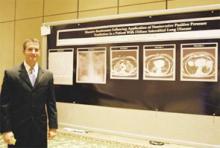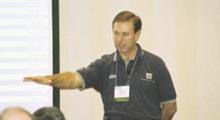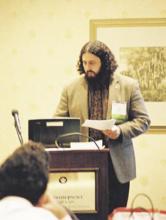User login
Distinguished by the high quality that has become the trademark of the Society of Hospital Medicine’s meetings, the Sixth Annual Southern Regional Meeting began with a Practice Management pre-course directed by Joseph Miller. The course served as a template of SHM’s prospective educational efforts and generated immense enthusiasm from aTendees. Addressing the spectrum of hospital practices, pioneers of the specialty including Drs. Win Whitcomb and John Nelson presented topics ranging from recruitment to retention. Roger A. Heroux, PhD and Mr. Martin B. Buser emphasized practical means by which hospitalists can demonstrate value and how best to offer “proof” of return-on-investment in hospital practices.
For the first time the Southern Regional Meeting took place outside of Atlanta and with a new co-sponsor, Mayo Clinic. Orlando played host to the near‑record attendance conference that occurred on Walt Disney World property at the Wyndham Palace. The conference also included a new emphasis on families, offering a new spouse/family program that gave attendees and their families discounted tickets to parks and ideas for outings. The overwhelming success of the program suggested this may be a productive addition to other SHM meetings.
Day one of the main conference stressed the latest evidence in hospital medicine. The first plenary sessions focused on the most common cardiac hospital admissions: acute coronary syndromes (Dr. Keith Oken), atrial fibrillation (Dr. Joseph Blackshear), and diastolic heart failure (Dr. Eugene Page).
Given the increasing importance of the hospitalist in management of patients in the perioperative period, the conference then focused on unique aspects of pre-operative and intra-operative care. Perennial favorite Dr. Geno Merli presented data on the (lack of) evidence supporting most preoperative testing, while newcomers Drs. Neil Feinglass and Bruce Leone presented anesthesiologists’ perspectives on the impact of hospitalists on the surgical patient.
Hospitalists are increasingly on the frontlines of trying to minimize error and improve outcomes. Accordingly, early aaernoon topics looked at two issues in this regard: Heparin-Induced Thrombocytopenia (Dr. Jay Herman) and Improving Outcomes in Cardiac Arrest (Dr. Jason Persoff). Then attendees were able to choose from a spectrum of breakout sessions and workshops that ranged from the integration of nurse practitioners/PAs (Dr. Mitchell Wilson) to performing clinical research (Dr. Mike Picco). Dr. Merli held his popular discussion on anticoagulation in the perioperative period. Dr. Bruce Mitchell and Dr. Jared Morton spearheaded two sessions focusing on minorities in hospital medicine and on the unique aspects of hospitalists on physicians in training, respectively. Finally, Dr. Larry Wellikson provided practical information on how to get a job in hospital medicine as one of the closing sessions of the day.
Dr. Beril Cakir chaired the abstract competition at the end of the first day. Thirteen abstracts from over 6 institutions were presented. Dr. Greg Pendell, from Mayo Clinic Jacksonville, was awarded first place and the opportunity to present in April at the Annual Session in Chicago.
Day two built on the theme of hospital medicine’s diversity, with topics ranged from Emerging Infectious Threats (Dr. Walter Hellinger) and the CDC’s Mandate to Reduce Antimicrobial Resistance (Dr. Dan Dressler) to Status Epilepticus (Dr. David Chabolla). Dr. Amir Jaffer spoke about the Cleveland Clinic’s successful preoperative care clinic, while Dr. Archana Roy reviewed the most infl uential research articles to impact the specialty over the past year.
As a leader in advocating tighter glucose control in inpatients, Dr. Guillermo Umpierrez spoke about the paradigm change regarding what is truly considered “good” control of blood sugar in inpatients with diabetes, emphasizing how glucose control can impact mortality. The plenary session closed with an exciting update on the emergence of the specialty of Hospital Medicine by Dr. Larry Wellikson, SHM’s CEO.
Emphasizing the humanity of hospitalists, afternoon workshops included a special workshop by pediatrician Dr. Susie Gerik about the Spiritual Review of Systems, followed by Dr. James Lyman’s workshop on End-of-Life Opportunities for Hospitalists. Both spoke about the emotional aspects of caring for adult patients with severe illness and in those for whom hospice care is the mainstay of therapy.
Dr. Jeff Garland led a standing room only group through various approaches to oxygenation and ventilation in acutely ill patients. Dr. Solomon Tafari presented an evidence-based approach to the unconscious patient, and Dr. Mellena Bridges went over several CT scan case studies. Dr. Mike Picco reviewed the complexity of medical statistics, while Dr. Guillermo Umpierrez gave his perennially popular workshop on endocrine emergencies.
The success of any conference lies not only in the contribution of those who stand before podium, but in the countless movements and machinations that occur behind the scenes to allow a conference to operate so flawlessly. To that end, I would like to commend the herculean job performed by the SHM staff, particularly Angela Musial, Erica Pearson, and Jane Mihelic, whose savvy and dedication gave conference goers a highly organized, orchestrated CME event. The sheer breadth and scope of the speakers and topics presented stem from the creativity and enthusiasm of the conference’s committee members, with special mention to Drs. Donna Dean (the highly under recognized but not under appreciated assistant course director), Ryan McNamara, Mitchell Wilson, Patrick Cawley, Beril Cakir, and Ron Angus.
I would like to close with special acknowledgement of those whose great vision and leadership have guided this annual event and served as a focal point for SHM’s emergence: Dr. Mark Williams and Dr. Larry Wellikson. I thank you both.
Dr. Williams and Emory University plan to continue the annual autumn meeting, which will return to Atlanta in November, 2005.
Distinguished by the high quality that has become the trademark of the Society of Hospital Medicine’s meetings, the Sixth Annual Southern Regional Meeting began with a Practice Management pre-course directed by Joseph Miller. The course served as a template of SHM’s prospective educational efforts and generated immense enthusiasm from aTendees. Addressing the spectrum of hospital practices, pioneers of the specialty including Drs. Win Whitcomb and John Nelson presented topics ranging from recruitment to retention. Roger A. Heroux, PhD and Mr. Martin B. Buser emphasized practical means by which hospitalists can demonstrate value and how best to offer “proof” of return-on-investment in hospital practices.
For the first time the Southern Regional Meeting took place outside of Atlanta and with a new co-sponsor, Mayo Clinic. Orlando played host to the near‑record attendance conference that occurred on Walt Disney World property at the Wyndham Palace. The conference also included a new emphasis on families, offering a new spouse/family program that gave attendees and their families discounted tickets to parks and ideas for outings. The overwhelming success of the program suggested this may be a productive addition to other SHM meetings.
Day one of the main conference stressed the latest evidence in hospital medicine. The first plenary sessions focused on the most common cardiac hospital admissions: acute coronary syndromes (Dr. Keith Oken), atrial fibrillation (Dr. Joseph Blackshear), and diastolic heart failure (Dr. Eugene Page).
Given the increasing importance of the hospitalist in management of patients in the perioperative period, the conference then focused on unique aspects of pre-operative and intra-operative care. Perennial favorite Dr. Geno Merli presented data on the (lack of) evidence supporting most preoperative testing, while newcomers Drs. Neil Feinglass and Bruce Leone presented anesthesiologists’ perspectives on the impact of hospitalists on the surgical patient.
Hospitalists are increasingly on the frontlines of trying to minimize error and improve outcomes. Accordingly, early aaernoon topics looked at two issues in this regard: Heparin-Induced Thrombocytopenia (Dr. Jay Herman) and Improving Outcomes in Cardiac Arrest (Dr. Jason Persoff). Then attendees were able to choose from a spectrum of breakout sessions and workshops that ranged from the integration of nurse practitioners/PAs (Dr. Mitchell Wilson) to performing clinical research (Dr. Mike Picco). Dr. Merli held his popular discussion on anticoagulation in the perioperative period. Dr. Bruce Mitchell and Dr. Jared Morton spearheaded two sessions focusing on minorities in hospital medicine and on the unique aspects of hospitalists on physicians in training, respectively. Finally, Dr. Larry Wellikson provided practical information on how to get a job in hospital medicine as one of the closing sessions of the day.
Dr. Beril Cakir chaired the abstract competition at the end of the first day. Thirteen abstracts from over 6 institutions were presented. Dr. Greg Pendell, from Mayo Clinic Jacksonville, was awarded first place and the opportunity to present in April at the Annual Session in Chicago.
Day two built on the theme of hospital medicine’s diversity, with topics ranged from Emerging Infectious Threats (Dr. Walter Hellinger) and the CDC’s Mandate to Reduce Antimicrobial Resistance (Dr. Dan Dressler) to Status Epilepticus (Dr. David Chabolla). Dr. Amir Jaffer spoke about the Cleveland Clinic’s successful preoperative care clinic, while Dr. Archana Roy reviewed the most infl uential research articles to impact the specialty over the past year.
As a leader in advocating tighter glucose control in inpatients, Dr. Guillermo Umpierrez spoke about the paradigm change regarding what is truly considered “good” control of blood sugar in inpatients with diabetes, emphasizing how glucose control can impact mortality. The plenary session closed with an exciting update on the emergence of the specialty of Hospital Medicine by Dr. Larry Wellikson, SHM’s CEO.
Emphasizing the humanity of hospitalists, afternoon workshops included a special workshop by pediatrician Dr. Susie Gerik about the Spiritual Review of Systems, followed by Dr. James Lyman’s workshop on End-of-Life Opportunities for Hospitalists. Both spoke about the emotional aspects of caring for adult patients with severe illness and in those for whom hospice care is the mainstay of therapy.
Dr. Jeff Garland led a standing room only group through various approaches to oxygenation and ventilation in acutely ill patients. Dr. Solomon Tafari presented an evidence-based approach to the unconscious patient, and Dr. Mellena Bridges went over several CT scan case studies. Dr. Mike Picco reviewed the complexity of medical statistics, while Dr. Guillermo Umpierrez gave his perennially popular workshop on endocrine emergencies.
The success of any conference lies not only in the contribution of those who stand before podium, but in the countless movements and machinations that occur behind the scenes to allow a conference to operate so flawlessly. To that end, I would like to commend the herculean job performed by the SHM staff, particularly Angela Musial, Erica Pearson, and Jane Mihelic, whose savvy and dedication gave conference goers a highly organized, orchestrated CME event. The sheer breadth and scope of the speakers and topics presented stem from the creativity and enthusiasm of the conference’s committee members, with special mention to Drs. Donna Dean (the highly under recognized but not under appreciated assistant course director), Ryan McNamara, Mitchell Wilson, Patrick Cawley, Beril Cakir, and Ron Angus.
I would like to close with special acknowledgement of those whose great vision and leadership have guided this annual event and served as a focal point for SHM’s emergence: Dr. Mark Williams and Dr. Larry Wellikson. I thank you both.
Dr. Williams and Emory University plan to continue the annual autumn meeting, which will return to Atlanta in November, 2005.
Distinguished by the high quality that has become the trademark of the Society of Hospital Medicine’s meetings, the Sixth Annual Southern Regional Meeting began with a Practice Management pre-course directed by Joseph Miller. The course served as a template of SHM’s prospective educational efforts and generated immense enthusiasm from aTendees. Addressing the spectrum of hospital practices, pioneers of the specialty including Drs. Win Whitcomb and John Nelson presented topics ranging from recruitment to retention. Roger A. Heroux, PhD and Mr. Martin B. Buser emphasized practical means by which hospitalists can demonstrate value and how best to offer “proof” of return-on-investment in hospital practices.
For the first time the Southern Regional Meeting took place outside of Atlanta and with a new co-sponsor, Mayo Clinic. Orlando played host to the near‑record attendance conference that occurred on Walt Disney World property at the Wyndham Palace. The conference also included a new emphasis on families, offering a new spouse/family program that gave attendees and their families discounted tickets to parks and ideas for outings. The overwhelming success of the program suggested this may be a productive addition to other SHM meetings.
Day one of the main conference stressed the latest evidence in hospital medicine. The first plenary sessions focused on the most common cardiac hospital admissions: acute coronary syndromes (Dr. Keith Oken), atrial fibrillation (Dr. Joseph Blackshear), and diastolic heart failure (Dr. Eugene Page).
Given the increasing importance of the hospitalist in management of patients in the perioperative period, the conference then focused on unique aspects of pre-operative and intra-operative care. Perennial favorite Dr. Geno Merli presented data on the (lack of) evidence supporting most preoperative testing, while newcomers Drs. Neil Feinglass and Bruce Leone presented anesthesiologists’ perspectives on the impact of hospitalists on the surgical patient.
Hospitalists are increasingly on the frontlines of trying to minimize error and improve outcomes. Accordingly, early aaernoon topics looked at two issues in this regard: Heparin-Induced Thrombocytopenia (Dr. Jay Herman) and Improving Outcomes in Cardiac Arrest (Dr. Jason Persoff). Then attendees were able to choose from a spectrum of breakout sessions and workshops that ranged from the integration of nurse practitioners/PAs (Dr. Mitchell Wilson) to performing clinical research (Dr. Mike Picco). Dr. Merli held his popular discussion on anticoagulation in the perioperative period. Dr. Bruce Mitchell and Dr. Jared Morton spearheaded two sessions focusing on minorities in hospital medicine and on the unique aspects of hospitalists on physicians in training, respectively. Finally, Dr. Larry Wellikson provided practical information on how to get a job in hospital medicine as one of the closing sessions of the day.
Dr. Beril Cakir chaired the abstract competition at the end of the first day. Thirteen abstracts from over 6 institutions were presented. Dr. Greg Pendell, from Mayo Clinic Jacksonville, was awarded first place and the opportunity to present in April at the Annual Session in Chicago.
Day two built on the theme of hospital medicine’s diversity, with topics ranged from Emerging Infectious Threats (Dr. Walter Hellinger) and the CDC’s Mandate to Reduce Antimicrobial Resistance (Dr. Dan Dressler) to Status Epilepticus (Dr. David Chabolla). Dr. Amir Jaffer spoke about the Cleveland Clinic’s successful preoperative care clinic, while Dr. Archana Roy reviewed the most infl uential research articles to impact the specialty over the past year.
As a leader in advocating tighter glucose control in inpatients, Dr. Guillermo Umpierrez spoke about the paradigm change regarding what is truly considered “good” control of blood sugar in inpatients with diabetes, emphasizing how glucose control can impact mortality. The plenary session closed with an exciting update on the emergence of the specialty of Hospital Medicine by Dr. Larry Wellikson, SHM’s CEO.
Emphasizing the humanity of hospitalists, afternoon workshops included a special workshop by pediatrician Dr. Susie Gerik about the Spiritual Review of Systems, followed by Dr. James Lyman’s workshop on End-of-Life Opportunities for Hospitalists. Both spoke about the emotional aspects of caring for adult patients with severe illness and in those for whom hospice care is the mainstay of therapy.
Dr. Jeff Garland led a standing room only group through various approaches to oxygenation and ventilation in acutely ill patients. Dr. Solomon Tafari presented an evidence-based approach to the unconscious patient, and Dr. Mellena Bridges went over several CT scan case studies. Dr. Mike Picco reviewed the complexity of medical statistics, while Dr. Guillermo Umpierrez gave his perennially popular workshop on endocrine emergencies.
The success of any conference lies not only in the contribution of those who stand before podium, but in the countless movements and machinations that occur behind the scenes to allow a conference to operate so flawlessly. To that end, I would like to commend the herculean job performed by the SHM staff, particularly Angela Musial, Erica Pearson, and Jane Mihelic, whose savvy and dedication gave conference goers a highly organized, orchestrated CME event. The sheer breadth and scope of the speakers and topics presented stem from the creativity and enthusiasm of the conference’s committee members, with special mention to Drs. Donna Dean (the highly under recognized but not under appreciated assistant course director), Ryan McNamara, Mitchell Wilson, Patrick Cawley, Beril Cakir, and Ron Angus.
I would like to close with special acknowledgement of those whose great vision and leadership have guided this annual event and served as a focal point for SHM’s emergence: Dr. Mark Williams and Dr. Larry Wellikson. I thank you both.
Dr. Williams and Emory University plan to continue the annual autumn meeting, which will return to Atlanta in November, 2005.


